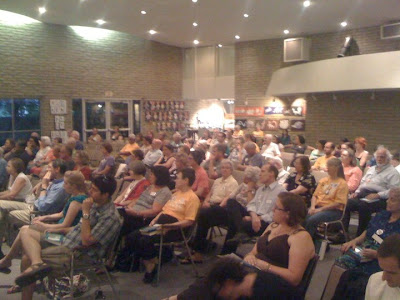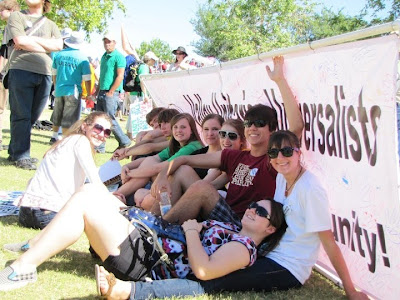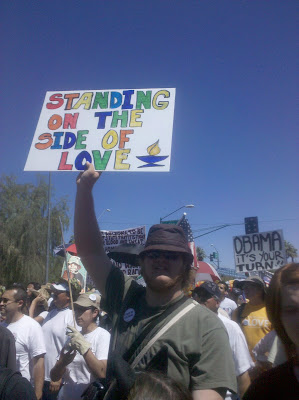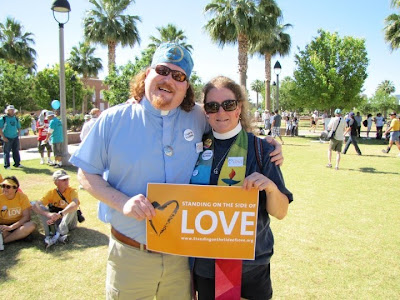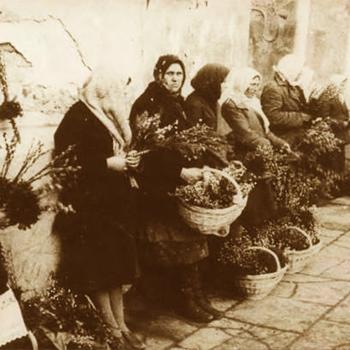WHAT PART OF ILLEGAL DON’T YOU UNDERSTAND?
A Meditation on America’s Immigration Debate and the Ocean of Longing
30 May 2010
A Sermon delivered at Bell Street Chapel
in Providence, Rhode Island
by James Ishmael Ford
Text
Give me your tired, your poor, your huddled masses yearning to breathe free, the wretched refuse of your teeming shore. Send these, the homeless, tempest-tost to me, I lift my lamp beside the golden door.
Emma Lazarus.
I think about that golden door. I wonder. I dream.
Whatever else may be true about the questions of illegal immigration to our country, there is one aspect that most compels me to join those who call for mercy as well as justice. And ultimately to stand with those who have taken the dangerous and illegal initiative to come to this country. And that is this. They see us as the golden door, the bright light of possibility, the city on the hill that our ancestors dreamed of being. They are the American dream. I’m particularly drawn to the poor who long to come here. That ocean of longing is I have no doubt for themselves, but even more it is for their children, who they dream, dream will be Americans.
I’m not saying there aren’t problems that must be addressed. I will speak to as much of that as possible in these next few minutes. But I am saying that both the American dream and our own liberal faith call us to stand with these people, and to help to find the way through for all of us. Let me speak to why our call to stand on the side of love is a call to stand with the immigrant, legal and illegal.
Specifically let me illustrate the actual face of illegal immigration. In November of 2007, Manuel Jesus Cordova Soberanes, crossed that most dangerous and unforgiving border in Arizona in search of work, for that chance to lift his family out of grinding poverty, poverty few in this room can imagine. A bricklayer, he believed he could get work in Tucson. It was evening and the desert heat was turning bitter cold. He had been walking for two days and was some fifty miles from the city when he came across the van, crashed some three hundred feet beneath a forest service road. Dawn Tomko, the driver, was dead. However her nine-year old child Christopher was still alive if in shock. Manuel pulled him out of the wreck, took the worn sweater off his back, covered the boy, and then built a fire. Something he had not dared to do before for fear of discovery, something he now desperately wanted. The man and the boy huddled through the night. The next day Manuel waved down some hunters who called for help. The day after that he was deported back to Mexico.
Under Arizona’s new law he would have been charged as a criminal for not having documents. And the jail sentence is mandatory.
This past Friday evening several hundred Unitarian Universalists gathered at the Unitarian Universalist Congregation of Phoenix to discuss the march on Sunday. Possibly fifty clergy were present. There were speeches including particularly compelling stories of undocumented people within our community, of family disruption, and of constant fear.
Fear has been the common denominator of the immigrant debate. The American born are afraid of many things. Threats to jobs, the drain on social services, national security, what feels like the disintegration of the Mexican nation, and certainly the drug wars, which to date have only barely tumbled across the border, but loom large in the imagination, particularly for those near the border. For the immigrants fear of discovery and deportation, or even worse of having some members of their families deported while others remain. Or, even worse, things that should not be said in a house of worship. Fear runs deep. At the Phoenix church we heard that story too often repeated of one family torn apart, of children weeping for their mother handcuffed and driven away. We heard of desperation and we heard of hope. We saw their faces. We heard their voices. We could touch them. They reached out and grabbed our hearts.
And so here we are, the Sunday after a great demonstration in Phoenix. I’m so glad I was there. It was exhilarating. People of many different world-views gathered together, some calling on God’s kingdom, other’s on Marx’s, others just wanting a chance. Now the demonstration is over. Now we’re left with a moment of reflection before the heart calls us to more work. And there is more work to do.
We’re struggling with both the specifics of Arizona’s noxious law which, for a moment threatened us here in Rhode Island, so far from the border, and may again, as well as needing to consider the larger questions of immigration. So, naturally, there had been quite a mix of folk at that event and lots of different agendas offered up. Sadly, what I also saw was how the issues around immigration into our country are rarely presented in good faith. But it is important to try and understand the truth of the matter, to know at least those facts that can be ascertained. The morality is always going to be a bit murkier. But as we conclude, I’ll try to address that, as well.
As I began researching the issues of immigration and illegal immigration into our country I quickly discovered one good rule of thumb. If someone offers a flat statistic about anything dealing with illegal immigration, assume they’re concerned with something other than finding truth. I think of Representative Palumbo’s oft-repeated statistic that there are 40,000 undocumented immigrants in Rhode Island. There might be. I don’t know. And neither does the representative. If there isn’t a range, or some kind of qualifier, it’s a lie. At least to the extent it isn’t meant to inform, but rather to sway. And, of course that inclination is just as true for the left as for the right. We need to be honest, most of all honest with ourselves.
Now there are people who appear to be trying to be honest brokers out there. Doesn’t mean they’re right, just that they’re trying. So, let’s look a little at numbers. In 2005 the Department of Homeland Security estimated there are roughly 10.5 million “unauthorized” as they designate undocumented people in the county. The Pew Hispanic Center in 2006 in as they called it, their “indirect estimate,” felt there were between 11.5 and 12 million undocumented people here. In 2006 the Government Accountability Office estimated every year half a million people attempt to enter the US or stay on without appropriate documentation. Whatever the true numbers are we’re talking a staggering amount of people. In the aggregate there are more illegal or undocumented immigrants in this country than in all other countries counted together.
A couple of other things people should know. About half of the undocumented people in this country did not cross the border illegally. They arrived with some sort of documents, often tourist or business visas and moved to undocumented status when their visas expired. Not only does this suggest that the undocumented in general are often much better educated than is commonly thought, the trend appears to be continuing in that direction.
And most important most studies show the economics of all this are extremely complicated. So, on the one hand African Americans, too many of whom are at the lowest end of the American economic spectrum are hurt to some degree by close proximity of undocumented immigrants, and there are uncompensated losses around public education and for hospitals. These are facts on the ground. That acknowledged, a 2006 study published by the American Bar Association finds that in general the costs to social services providers are more than matched by income elsewhere. For instance, a study published in the NY Times estimates 7 billion dollars a year is collected for Social Security from people who will not draw any payments. Our economic interconnectedness is such that is probably impossible to expel the undocumented without severely damaging the country, Rajeev Goyle at the Center for American Progress, admittedly a liberal institution, estimates the cost of deporting all here without proper authorization would be in the neighborhood of 41 billion dollars a year.
Of course these aren’t the issues most people care about. We’ve always been a nation of immigrants. And we’ve always been uncomfortable with it. Benjamin Franklin was deeply worried about German immigration. When their turn came, my Irish ancestors were objects of fear and loathing. Later people worried about and tried to stop Italians, Jews, Middle Easterners, and of course, now, well, once again, Asians and now Hispanic immigrants. We’re a nation built upon change. And we tend not to like it.
Today in addition to the fear that immigrants and particularly undocumented immigrants take jobs and drain strapped public services, there are those worries about drug trafficking, and particularly the impact of Mexico’s raging drug wars, human smugglers, gang violence and identity theft. There is also a sometimes whispered, sometimes expressed full-throated, concern about color and language and a shifting face of America out of all this.
Pick your concern. There are plenty of options. Me, I’m worried about what happens to people in this country living without documentation, particularly those with the least formal education, which as I said are about half of the illegal immigrants here. They are subject to terrible exploitation, trafficking and violence, while working hard and trying to do something for families living in terrible conditions in their native countries.
So, what to do? Well, that part just isn’t clear. We desperately need an honest conversation. And it needs to happen at the Federal level. For many reasons, although frankly, I think more responsibility may be laid at the steps of the American right than the left, this has not happened. And it is this inaction connected to fear, often imagined, but sometimes also quite real that seems to take us to the basest responses. I understand. Me I am afraid of the drug wars and whether Mexico can sustain itself as a nation.
So, now Arizona has been caught up with a terrible law designed to criminalize being here without documents and to charge local law enforcement with pursuing anyone a police officer may have reasonable suspicion is here without documents. There has been a lot of attention given to how to keep this “reasonable suspicion” from being racial profiling. But, frankly, no matter how much lipstick is slathered on that pig, it is racial profiling. This is symptomatic of the fear and base response to that fear. And it is a poison we must not drink.
Yesterday in Phoenix I joined tens of thousands, at this moment I cannot find an official number, but it was a sea of people demonstrating against the cruelty of that law known as SB 1070. I joined hundreds of Unitarian Universalists, including some sixty ministers as well as our denominational moderator Gini Courter and our president Peter Morales. We marched and sang and prayed. The line “si se puede,” “yes we can” echoed across the throng.
Among the many placards and signs one particularly caught my eye. It was handmade and carried by an elderly woman. It simply read “the face of an illegal immigrant.” Beneath were pasted photographs of a brown-faced US Marine. I wondered, was this her child? Was he okay? So many stories wound together on that march, their stories, our stories.
Led by Valley Unitarian Universalist director of music ministries, Kellie Walker, as we UUs marched and sang “Standing on the Side of Love,” we quickly found ourselves joined by our fellow marchers joining in the chorus. I felt optimism. I felt hope. And now here we are. So, what is the take away?
We are already intertwined in ways that can never be unraveled. The questions are, really, only how do we bring love to the mix? How do we find ourselves looking at the immigrant and know we are looking at ourselves, at our best selves, as dreamers of a dream of possibility? It’s easy enough. Look bigger than the fear. Don’t constrict, look wide. Remember that Marine serving a country that could in a heartbeat deport his mother. See Manuel the bricklayer, hoping for a job, no plaster saint, just a man who saw a child, and knew what needed doing, and did it. Look to him and see exactly who we can be.
We do this, and I believe we will find the way through. That, too, is the dream. That is our possibility. Remember the golden door. Wonder. Dream.
And we will prevail.



